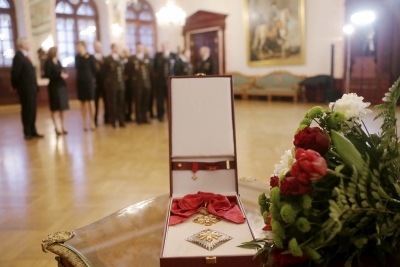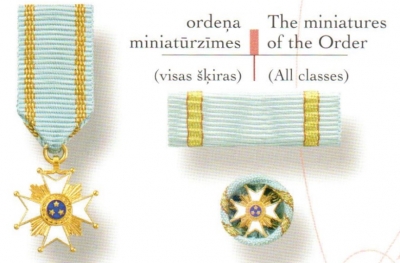How a person can be proposed for receiving state decorations?
Any person shall have the right to submit a proposal on the conferral of state decorations upon another person.
The Law of State Decorations of Latvia stipulates that any person may submit a proposal on the conferral of state decorations upon another person only because no person shall have the right to ask that he or she be granted state decorations.
Persons receive state decorations only by the procedures referred to in this law, with the President conferring state decorations by decisions taken by the Chapter of Orders.
The President shall have the right to recommend that state decorations be conferred upon any person by making the relevant proposal before the Chapter of Orders.
Where a person has been nominated for the conferral of state decorations, the following information shall be indicated:
- The nominee’s name, surname, address, occupation, or area of activity;
- The nominee’s identity number;
- For foreign nominees, the country of citizenship if known;
- A description of the nominee’s life;
- A general list of achievements concerning which the proposal on conferral has been made;
- A proposal from the person making the nomination;
- The name, surname, occupation, and address of the proposer where that is an individual and the name, company number and registered office of the proposer where that is a legal entity.
It is recommended that where proposals are made to confer state decorations upon a person, references from other people vis-à-vis the nominee also be attached.
Where a proposal is made to confer state decorations on a foreigner, the requirement of indicating identity number of a person proposed in a proposal on the conferral is optional.
Proposals on conferring state decorations shall be submitted to:
The Chapter of Orders
The Chancery of the President of Latvia
Pils laukums 3,
Riga LV-1900
Bestowing state decorations
State decorations are presented by the President of Latvia or by a person delegated by the President of Latvia to do so.
State decorations shall be presented in relation to the following historical events for the Republic of Latvia:
- The adoption of the Declaration of Independence of the Republic of Latvia on May 4;
- The Lāčplēsis Day on November 11;
- The Proclamation of the Republic of Latvia on November 18.
The state honours may be conferred during a state visit paid by the President of Latvia to another country or a state visit paid to Latvia by the head of state of another country, as well as to foreign ambassadors whose tour of duty in Latvia has ended.
Recipients of orders shall also receive a diploma, and recipients of a medal of honour shall receive a certificate, both to be signed by the President of Latvia and the Chancellor of the Chapter of Orders.
Persons receiving state decorations shall also receive the miniature version of the Order of medal of honour, as well as a copy of the statutes of the relevant Order or medal of honour.
Orders and medals of honour, except for the Order of Viesturs, are not awarded posthumously.
The number of persons to whom state decorations may be conferred is not limited regarding classes of orders or medals of honour, or in any other way.
A higher Class of the same Order or medal of honour may be awarded to an individual for new achievements, but no sooner than four years after the conferral of the original honours.
Where state decorations, diplomas and/or certificates have been lost, the recipient of the honours or the person who possesses the honours shall be obliged to so report to the Chapter of Orders. The lost state decorations may be restored, but in that case, the said individuals shall cover the cost of the restoration themselves.
Ladies, who received the second or third Class of the Order of the Three Stars, the Order of Viesturs, or the Cross of Recognition before 28 February 2011, may purchase an additional ribbon to wear the Order by the appropriate apparel, covering the cost of the said ribbon themselves.





